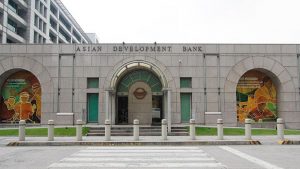THE PHILIPPINES received $6.02 billion in financial assistance from the Asian Development Bank (ADB) in 2024, the second-biggest recipient among the bank’s partner countries after India with $7.26 billion.
The other top recipients were Indonesia ($3.28 billion), Bangladesh ($3.21 billion), Pakistan ($2.99 billion), and Uzbekistan ($2.35 billion).
In its annual report released on Thursday, the bank reported that commitments to the Philippines, consisting of loans, grants, and co-financing programs, fell 28.16% year on year.
The Philippines had been the biggest recipient of financial assistance from the ADB in 2023.
Among the approved loans last year were the $1.19-billion first tranche of the Laguna Lakeshore Road Network facility and the $500-million support for the subprogram 1 of the public financial management (PFM) reform program.
The nearly 30-kilometer Laguna Lakeshore expressway aims to cut travel time between Taguig City and Calamba, Laguna.
Meanwhile, the PFM program is expected to improve national budget frameworks, boost local government capacity, and establish a PFM system in the Bangsamoro Autonomous Region in Muslim Mindanao.
Other loans include $474.6 million for subprogram 2 of the Climate Change Action Program and $30 million for the Project Development and Monitoring Facility managed by the Public-Private Partnership (PPP) Center to develop up to 35 new projects by 2029.
The climate-related policy-based loan will “finance the deployment of climate technologies and mobilize investments in renewable energy, energy efficiency, climate-resilient agriculture, and nature-based solutions.”
Another PPP-related program was the $2.1 billion support for the modernization of the Ninoy Aquino International Airport.
In addition, the Philippines also received $1.55 billion for co-financing projects and $6.6 million for technical assistance from the ADB last year.
In response to the housing shortage, the ADB committed a nonsovereign loan of $5 million for the property technology platform Lhoopa, Inc. to build affordable housing in Cebu, Davao, and Luzon.
The ADB also said that it launched new country partnership strategies for the Philippines, Cambodia, and Laos.
“Extending to 2029, the Philippine strategy prioritizes human development, economic competitiveness, quality infrastructure, and disaster resilience,” it said.
ADB Philippines Country Director Pavit Ramachandran has said the bank is hoping to approve loans worth $4 billion for 2025.
In the same report, the ADB said its overall commitments amounted to $24.30 billion, with $14.87 billion for co-financing.
“With our increased financial firepower and a sharper strategic focus, the ADB is turning commitment into concrete results,” ADB President Masato Kanda said.
“We are financing more affordable and efficient energy and transport systems, supporting a vibrant private sector that creates better-quality jobs, and strengthening basic services in education, health, and social protection. Together with our partners, we are building a brighter future for the next generation in Asia and the Pacific,” Mr. Kanda added. — Aubrey Rose A. Inosante

